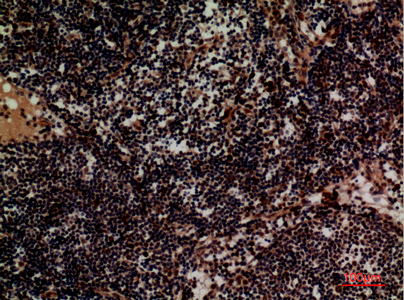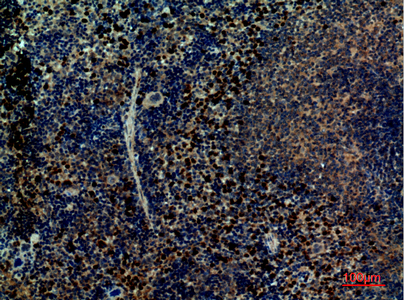Integrin α4 Polyclonal Antibody
- Catalog No.:YT5248
- Applications:WB;IHC;IF;ELISA
- Reactivity:Human;Mouse;Rat
- Target:
- Integrin α4
- Fields:
- >>PI3K-Akt signaling pathway;>>Focal adhesion;>>ECM-receptor interaction;>>Cell adhesion molecules;>>Hematopoietic cell lineage;>>Leukocyte transendothelial migration;>>Intestinal immune network for IgA production;>>Regulation of actin cytoskeleton;>>Yersinia infection;>>Leishmaniasis;>>Human papillomavirus infection;>>Hypertrophic cardiomyopathy;>>Arrhythmogenic right ventricular cardiomyopathy;>>Dilated cardiomyopathy
- Gene Name:
- ITGA4
- Protein Name:
- Integrin alpha-4
- Human Gene Id:
- 3676
- Human Swiss Prot No:
- P13612
- Mouse Gene Id:
- 16401
- Mouse Swiss Prot No:
- Q00651
- Immunogen:
- The antiserum was produced against synthesized peptide derived from the Internal region of human ITGA4. AA range:571-620
- Specificity:
- Integrin α4 Polyclonal Antibody detects endogenous levels of Integrin α4 protein.
- Formulation:
- Liquid in PBS containing 50% glycerol, 0.5% BSA and 0.02% sodium azide.
- Source:
- Polyclonal, Rabbit,IgG
- Dilution:
- WB 1:500 - 1:2000. IHC: 1:100-300 ELISA: 1:20000.. IF 1:50-200
- Purification:
- The antibody was affinity-purified from rabbit antiserum by affinity-chromatography using epitope-specific immunogen.
- Concentration:
- 1 mg/ml
- Storage Stability:
- -15°C to -25°C/1 year(Do not lower than -25°C)
- Other Name:
- ITGA4;CD49D;Integrin alpha-4;CD49 antigen-like family member D;Integrin alpha-IV;VLA-4 subunit alpha;CD49d
- Observed Band(KD):
- 120kD
- Background:
- integrin subunit alpha 4(ITGA4) Homo sapiens The gene encodes a member of the integrin alpha chain family of proteins. Integrins are heterodimeric integral membrane proteins composed of an alpha chain and a beta chain that function in cell surface adhesion and signaling. The encoded preproprotein is proteolytically processed to generate light and heavy chains that comprise the alpha 4 subunit. This subunit associates with a beta 1 or beta 7 subunit to form an integrin that may play a role in cell motility and migration. This integrin is a therapeutic target for the treatment of multiple sclerosis, Crohn's disease and inflammatory bowel disease. Alternative splicing results in multiple transcript variants. [provided by RefSeq, Oct 2015],
- Function:
- domain:The SG1 motif is involved in binding to chondroitin sulfate glycosaminoglycan and cell adhesion.,function:Integrins alpha-4/beta-1 (VLA-4) and alpha-4/beta-7 are receptors for fibronectin. They recognize one or more domains within the alternatively spliced CS-1 and CS-5 regions of fibronectin. They are also receptors for VCAM1. Integrin alpha-4/beta-1 recognizes the sequence Q-I-D-S in VCAM1. Integrin alpha-4/beta-7 is also a receptor for MADCAM1. It recognizes the sequence L-D-T in MADCAM1. On activated endothelial cells integrin VLA-4 triggers homotypic aggregation for most VLA-4-positive leukocyte cell lines. It may also participate in cytolytic T-cell interactions with target cells.,PTM:Phosphorylation on Ser-1027 inhibits PXN binding.,similarity:Belongs to the integrin alpha chain family.,similarity:Contains 7 FG-GAP repeats.,subunit:Heterodimer of an alpha and a beta subunit
- Subcellular Location:
- Membrane; Single-pass type I membrane protein.
- Expression:
- Lymph,Peripheral blood,Prostate,Spleen,Testis,
- June 19-2018
- WESTERN IMMUNOBLOTTING PROTOCOL
- June 19-2018
- IMMUNOHISTOCHEMISTRY-PARAFFIN PROTOCOL
- June 19-2018
- IMMUNOFLUORESCENCE PROTOCOL
- September 08-2020
- FLOW-CYTOMEYRT-PROTOCOL
- May 20-2022
- Cell-Based ELISA│解您多样本WB检测之困扰
- July 13-2018
- CELL-BASED-ELISA-PROTOCOL-FOR-ACETYL-PROTEIN
- July 13-2018
- CELL-BASED-ELISA-PROTOCOL-FOR-PHOSPHO-PROTEIN
- July 13-2018
- Antibody-FAQs
- Products Images

- Western Blot analysis of K562 cells using Integrin α4 Polyclonal Antibody. Antibody was diluted at 1:1000. Secondary antibody(catalog#:RS0002) was diluted at 1:20000
.jpg)
- Immunohistochemical analysis of paraffin-embedded human-lymph, antibody was diluted at 1:100
.jpg)
- Immunohistochemical analysis of paraffin-embedded human-lymph, antibody was diluted at 1:100

- Immunohistochemical analysis of paraffin-embedded human-lymph, antibody was diluted at 1:100
.jpg)
- Immunohistochemical analysis of paraffin-embedded mouse-spleen, antibody was diluted at 1:100

- Immunohistochemical analysis of paraffin-embedded mouse-spleen, antibody was diluted at 1:100



